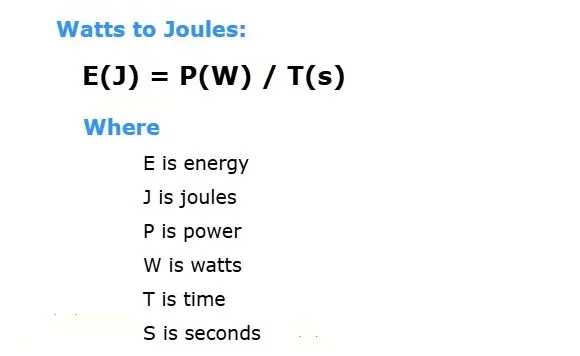Watts to Joules Converter - Convert Power to Energy
Convert between power (watts) and energy (joules) with time consideration. Understand energy consumption with real-world examples, cost analysis, and environmental impact.
Power consumption in watts
Duration in seconds
→?
Conversion Results
Enter power and time values to calculate energy
Related & Other Popular Converters
Watts to Joules conversion helps you calculate how much energy (in Joules) is consumed or produced based on power (Watts) and time (Seconds). This Watts to Joules Converter by SantPro Tools makes it effortless to calculate energy quickly and accurately for any electrical or mechanical system.
Whether you are a student, an engineer, or simply curious about power consumption, the Watts to Joules Calculator will provide you with the energy values in Joules (J) immediately - allowing you to come to a conclusion about how much energy might be used by an appliance over a period of time.

What Are Joules and Watts?
The Watts to Joules conversion is based on the simple physics formula:
E = P x t
Where:
This means 1 Watt for 1 second equals 1 Joule.
For example, if a 100W bulb runs for 3600 seconds (1 hour), it uses:
100 x 3600 = 360,000 Joules
Using SantPro Tools' Watts to Joules Converter, you can easily do these calculations in a much quicker time than doing it manually, and voiding manual errors.
How to use the Watts to Joules Calculator
The Watts to Joules Calculator also shows detailed steps, so you can learn how the conversion is done - ideal for students and professionals alike.
Formula for W to Joules
Energy (J) = Watts (W) × Seconds (s)
This W to Joules formula is the foundation for all energy calculations. It tells you how much energy (in joules) produced or consumed while a device with a certain wattage is running for a period of time.
Why use our Watts to Joules Converter?
Our Watts to Joules Calculator will give you the most accurate energy calculations in a matter of seconds - whether you’re doing a science project, studying engineering or figuring out how electricity is used at home.
Conversion Table: W to Joules Quick Reference
| Watts (W) | Seconds (s) | Joules (J) |
|---|---|---|
| 1 | 1 | 1 |
| 10 | 60 | 600 |
| 100 | 3600 | 360,000 |
| 500 | 1800 | 900,000 |
| 1000 | 3600 | 3,600,000 |
You can use this chart or rely on our Watts to Joules Calculator for instant results.
If you ever need to calculate energy quickly and accurately, the Watts to Joules Converter is the way to go. It is the best way to quickly convert energy whether for a physics project, testing power efficiency, or estimating electricity consumed. You can always rely on this Watts to Joules Calculator for fast energy conversion.
FAQs
The formula is Energy (J) = Power (W) x Time (s). Multiply watts by seconds to get energy in joules.
1 Watt equals 1 Joule per second. This means 1W = 1J/s.
Use the Watts to Joules Converter. Just input the power in watts and the time in seconds, and the utility will calculate the energy instantly.
Yes. Divide the total Joules by time (seconds) to get power in watts. Formula: Power (W) = Energy (J) ÷ Time (s).
Definitely! It is widely utilized in physics, for electrical engineering, and for determining energy consumption with respects to so many things ranging from bulbs, motors, and appliances.
Yes. This converter or calculator will even show you the energy results in kWh (kilowatt-hours) and calories so it can be useful in more scientific ways and for household appliances.